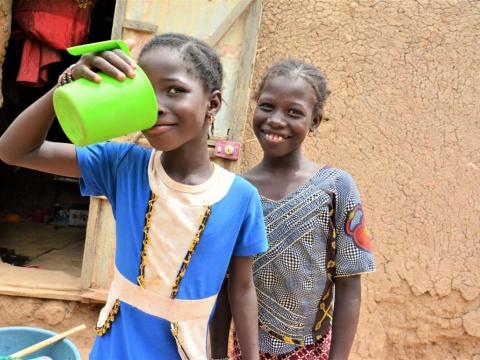What is the Problem in Mali?

A major humanitarian crisis, affecting 3.7 million people, that include 1.6 million of them children, is currently Mali’s biggest problem. This grave situation, exacerbated by raging inter-ethnic conflicts, predominantly pits the Fulani against the Dogon communities. The destructive ethnic tension, fueling murderous conflicts, had 160 residents of one village massacred in March, this year!
The main causative factor of the humanitarian crisis was conflict initially domiciled in the north. It has now spread into central region, rendering the hitherto relatively peaceful location insecure. It has affected Mopti and Segou regions, where World Vision Mali either has development programs or response interventions.
Sadly, an area that was supposed to be a harvest season for villagers in Central Mali has led to a season of starvation, death and destruction. The Dogon point fingers at the Fulani, whom they accuse of trespassing into their farmland to feed their animals, while the Fulani accuse the Dogon of killing and stealing their cattle. The blame game is reminiscent of a ping pong game, that is not being resolved.
The violence is not limited to Mali. In neighbouring Sahelian countries, Fulanis have been in conflict with other tribes as well. It is alleged that armed groups that include al-Qaeda and Islamic State affiliates are behind the conflict. Some of these affiliates even fought in the war in Libya.
It is worth remembering that the crisis in central Mali initially started in northern Mali in 2012. It was prompted by terrorist groups from Libya, who infiltrated the area after Libya’s collapse. The presence of 14,000 MINUSMA peace-keeping force today, has not stopped the violence, which is spreading and spiralling at an alarming rate.
The humanitarian catastrophe has prompted an urgent need for increased funding for Mali to support millions of people affected by spreading violence. Affected countries are Mali, Niger and Burkina Faso. The UN Resident and Humanitarian Coordinators for the three countries warn that the instability risks spilling over into other West African countries, with severe consequences.
Heightened Needs
According to the UN Resident and Humanitarian Coordinators for Mali, Niger and Burkina Faso, repeated and increasingly sophisticated armed attacks across the Sahel, coupled with food shortages linked to last year’s severe drought, has reached unprecedented levels, putting the future of a “whole generation” at stake.
Needs are growing, amid a five-fold rise in displacement in the last 12 months. This has seen more than 330,000 people leave their homes, in addition to 100,000 refugees. Reports indicate that in Mali, more than 1,800 schools have closed and over 80 health centres are either shut or only partially operational.
Unfortunately, humanitarian agencies are facing significant challenges in availing the life-saving interventions to affected populations, as the raging conflict, coupled with kidnappings, have rendered access to the affected communities difficult.